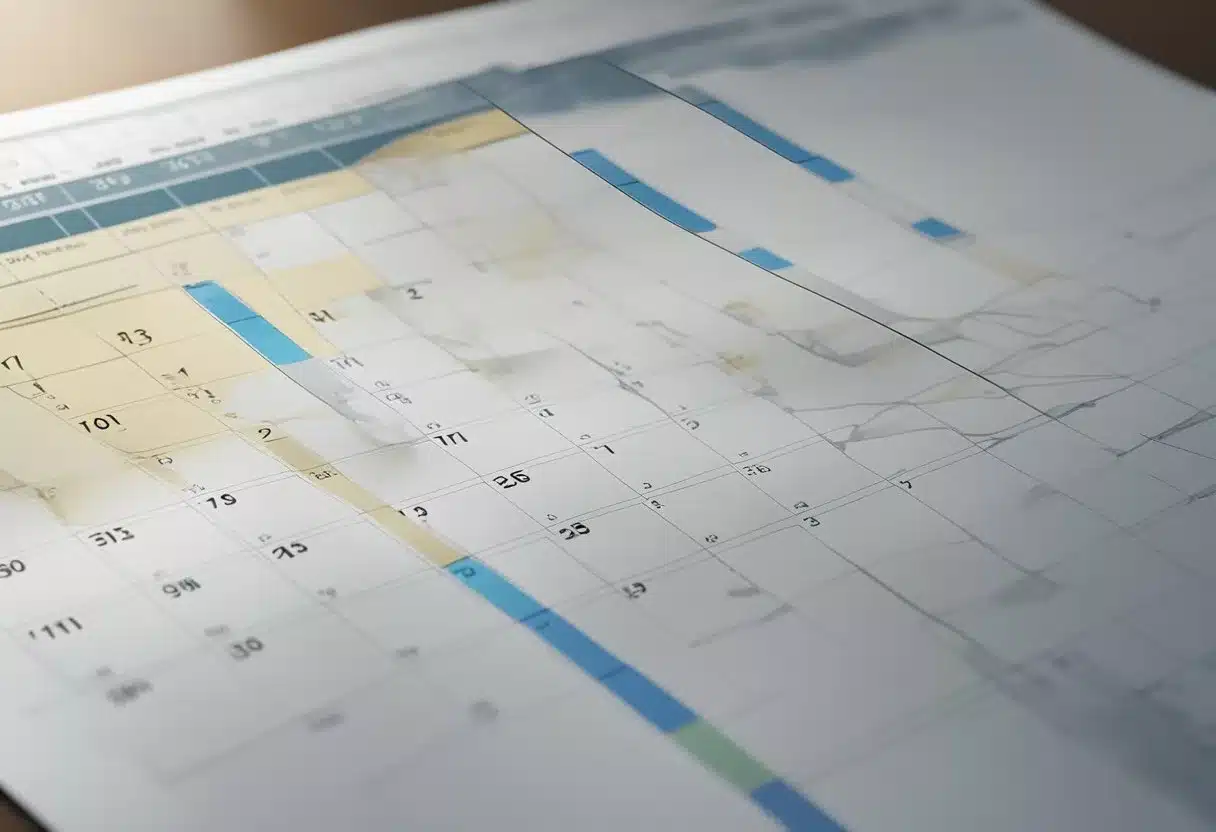It’s not uncommon to worry when a menstrual period doesn’t arrive as expected. Many wonder, “How late can a period be?” A period is considered late if it is more than 7 days past its expected date. While some variations in cycle length are normal, a period that is six weeks late can be considered a missed period.
Several factors can influence why a period might be late. Lifestyle changes, stress, and health conditions can all play a part in affecting menstrual cycle regularity. Knowing these factors helps in understanding when a late period might be a cause for concern.
Understanding your menstrual cycle and recognizing patterns can give you better control over your reproductive health. Tracking your cycle helps in identifying what is normal for you and when it might be time to consult a healthcare provider if your period is consistently late.
Key Takeaways
- A period is late if it’s more than 7 days past due.
- Various factors like lifestyle and health can affect cycle regularity.
- Tracking your cycle helps in identifying when to see a doctor.
Understanding Menstrual Cycles
The menstrual cycle is a complex process that involves several stages and can vary greatly between individuals. Key aspects include the cycle length, variations in the cycle, and the process of ovulation.
Menstrual Cycle Basics
The menstrual cycle is the time from the first day of one period to the first day of the next. A typical cycle lasts about 28 days, though it can range from 21 to 35 days. The cycle is divided into several phases: menstrual, follicular, ovulation, and luteal.
During the menstrual phase, the uterine lining sheds. This bleeding lasts around 3-7 days. Following this, the follicular phase begins, where follicles in the ovaries mature.
Next is ovulation, where a mature egg is released. This occurs around day 14 in a 28-day cycle but can vary. The luteal phase follows, lasting about 14 days, where the body prepares for a possible pregnancy.
Normal Cycle Variation
While a 28-day cycle is considered average, cycles can be shorter or longer. It’s normal for cycle lengths to vary by a few days from month to month. Factors like stress, diet, and exercise can influence cycle regularity.
Many people experience irregular periods at some point. An irregular cycle is one that varies more than 7-9 days. This can be common during adolescence and perimenopause. Tracking one’s cycle can help identify patterns and variations.
Some common causes of irregular periods include hormonal imbalances and medical conditions. It’s important to pay attention to significant changes and consult a healthcare provider if necessary.
Ovulation and Fertility
Ovulation is a key part of the menstrual cycle and occurs when an egg is released from the ovary. It usually happens midway through the cycle, around day 14 in a 28-day cycle. However, this can vary from one cycle to another.
Signs of ovulation include mild cramping, increased cervical mucus, and changes in basal body temperature. Ovulation can be tracked using ovulation predictor kits.
Fertility is highest around the time of ovulation. The fertile window is about 5 days before and 1 day after ovulation. Understanding one’s ovulation cycle can help in planning for pregnancy or avoiding it.
Factors Influencing Period Regularity

Menstrual cycles can be affected by various factors, leading to irregularities. These factors include hormonal imbalances, changes in body weight, physical activity levels, and lifestyle stressors.
Hormonal Influences
Hormones play a crucial role in regulating the menstrual cycle. Estrogen and progesterone levels need to be balanced for regular periods. An imbalance can result in delays or missed periods. Conditions such as polycystic ovary syndrome (PCOS) and thyroid disorders can cause significant hormonal disruptions. For example, PCOS is linked to irregular periods due to excess androgens, while hypothyroidism can lead to heavier or less frequent periods.
Body Weight and Exercise
Body weight, whether gained or lost, affects menstrual cycles. Extreme weight loss can result in a condition called amenorrhea, the absence of menstruation. Conversely, significant weight gain can disrupt hormone balance and cycle regularity. Exercise routines also influence cycles; intense physical activity can reduce body fat and alter hormone levels, leading to delayed or irregular periods. Balanced body weight and moderate exercise are key to maintaining menstrual health.
Stress and Lifestyle
Stress significantly impacts menstrual cycles by influencing hormones like cortisol. High stress levels can delay periods or make them irregular. Lifestyle changes, such as moving to a new environment or altering sleep patterns, also play a role. Stressful events and poor lifestyle habits can disturb the body’s natural rhythms and impact cycle regularity. Reducing stress through relaxation techniques and maintaining a healthy lifestyle can help restore regular menstrual cycles.
Birth Control and Menstruation

Birth control can significantly affect menstruation, leading to changes in cycle regularity, flow, and symptoms. The impact can vary depending on the type of contraceptive used, such as hormonal birth control or intrauterine devices (IUDs).
Impact of Hormonal Birth Control
Hormonal birth control methods, such as birth control pills, patches, and rings, often contain estrogen and progestin. These hormones can regulate, lighten, or sometimes halt menstrual periods. It is common for users to experience shorter or lighter periods.
Some users may notice missed periods due to the stabilizing effect of the hormones on the uterine lining. Breakthrough bleeding or spotting can occur, especially in the first few months of use, as the body adapts to the hormones. Pills taken continuously to skip periods can result in fewer or no periods over time.
Birth control injections and implants, which primarily use progestin, might cause irregular periods or amenorrhea (absence of menstruation). These effects are often considered normal and can vary from person to person.
Intrauterine Devices (IUDs) and Menstrual Changes
IUDs come in two types: hormonal and copper. Each type impacts menstruation differently.
Hormonal IUDs release progestin, which can lead to lighter periods, less cramping, and in some cases, the complete cessation of periods. The hormone thickens cervical mucus, thins the uterine lining, and may inhibit ovulation.
In contrast, the copper IUD does not use hormones. It can cause longer, heavier periods with more intense cramping, especially in the first few months after insertion. However, these side effects often decrease over time.
Users of either type of IUD should discuss any significant changes or concerns with their healthcare provider to ensure their chosen method is the most suitable for their needs.
Life Stages and Menstrual Health

Menstrual health changes as a person ages, especially during menopause, perimenopause, and pregnancy. These life stages can cause different symptoms and alterations in the menstrual cycle.
Menopause and Perimenopause
Menopause typically occurs between ages 45 and 55. Menopause marks the end of menstrual cycles, defined as occurring 12 months after the last period. Hormone levels like estrogen and progesterone decrease during this time.
Perimenopause is the transition period before menopause. It can begin several years before menopause and involves hormonal changes that start in a woman’s 40s or even earlier. During perimenopause, menstrual cycles can become irregular, with skipped periods, heavier or lighter flow, and changes in cycle length. Other symptoms may include hot flashes, night sweats, and mood swings.
Understanding these changes can help manage symptoms more effectively.
Pregnancy-Related Changes
Pregnancy is a common reason for missed periods. When pregnant, menstrual cycles stop as hormonal changes support the developing baby. Early signs may include missed periods, nausea, and breast tenderness.
During pregnancy, other conditions like primary ovarian insufficiency (POI) can affect menstrual health. POI occurs when ovaries stop functioning normally before age 40, leading to irregular or missed periods.
Tracking symptoms and consulting healthcare providers can ensure proper care. It’s essential to differentiate between typical pregnancy symptoms and other underlying health issues.
The Effects of Age on Menstruation
As individuals age, their menstrual health changes. Younger people often have more regular cycles, while those approaching menopause experience more variability.
In their 20s and 30s, cycles tend to be more stable, although stress, lifestyle changes, and medical conditions like polycystic ovary syndrome (PCOS) can cause irregularities.
Approaching their 40s, individuals may notice changes due to perimenopause. Monitoring these changes helps in understanding what’s normal and when to seek help.
Age-related changes are a normal part of life stages, but being informed helps manage symptoms and maintain health.
Diagnosis and When to See a Doctor
Menstrual irregularities can be caused by various factors. Knowing when to seek medical attention is crucial.
Recognizing Abnormal Symptoms
Late periods can sometimes signal underlying health issues. Common symptoms to watch for include:
- Severe pain: Intense cramps that disrupt daily life.
- Heavy bleeding: Soaking through one or more pads or tampons every hour for several hours.
- Prolonged bleeding: Menstrual flow lasting more than seven days.
- Irregular cycles: Frequently changing cycle lengths.
- Missed periods: Going without a period for more than three months without pregnancy.
If any of these symptoms occur, it is important to contact a healthcare provider. These conditions could indicate problems like uterine polyps or hormonal imbalances.
Diagnostic Tests and Procedures
Doctors use various methods to find the cause of late or missed periods. Common diagnostic tests include:
- Pregnancy test: To rule out or confirm pregnancy.
- Blood tests: Check hormone levels like thyroid, prolactin, and sex hormones.
- Ultrasound: Evaluates reproductive organs for abnormalities such as uterine polyps or ovarian cysts.
- Endometrial biopsy: Examines tissue from the uterus to check for cancer or other conditions.
- Pelvic exam: Helps detect physical changes or infections.
Each of these tests helps the doctor determine the right treatment and manage irregular periods effectively. Early diagnosis ensures the best outcomes.
Practical Advice and Tips
Paying attention to your menstrual cycle can help identify any irregularities. Additionally, maintaining a healthy lifestyle is crucial for balanced hormones and regular periods.
Tracking Your Menstrual Cycle
Keeping track of your menstrual cycle helps you notice any unusual patterns. Use a period tracker app or a calendar to mark the start and end dates of your period. This can help estimate ovulation days and fertile windows, which is helpful for those focusing on fertility.
Noting symptoms like cramps, fatigue, and mood changes can also be beneficial. Consider using special calculators like an ovulation calculator or a pregnancy test calculator to gain more insights. Tracking can be even more essential if you’re breastfeeding, as it impacts cycle regularity.
Maintaining a Healthy Lifestyle
A healthy lifestyle supports a regular menstrual cycle. Eating a balanced diet rich in vitamins and minerals is essential. Focus on foods high in iron, calcium, and other nutrients to combat fatigue and support overall health.
Regular exercise helps regulate periods, but avoid excessive workouts which can disrupt your cycle. Managing stress through practices like yoga or meditation can also help, as stress is a common cause of late periods. Minimizing alcohol and caffeine intake is recommended, and ensure you’re getting enough sleep.
By tracking their menstrual cycle and maintaining a healthy lifestyle, individuals can manage their periods better and identify any issues early on.
Understanding Late Periods
A late period can make anyone anxious. It’s important to know what defines a late period and when it might be a cause for concern.
What Constitutes a Late Period
Periods can vary from person to person, but a period is generally considered late if it is more than seven days past its expected date. The average menstrual cycle is about 28 days long but can range from 21 to 35 days. If a period is more than six weeks late, it is usually considered a missed period.
A pregnancy test is often the first step if a period is late, as pregnancy is a common cause. Besides pregnancy, factors like stress, significant weight loss or gain, and changes in physical activity can also affect the menstrual cycle. Medical conditions, including polycystic ovary syndrome (PCOS) and thyroid disorders, can contribute to late or missed periods. Regular cycles can be disrupted temporarily and might not always indicate a serious issue.
Frequently Asked Questions
Periods can be late for various reasons, and while pregnancy is a common cause, there are other factors to consider. Below are some key questions and answers to help you understand more.
Why is my period late if I’m not pregnant?
A period can be late due to stress, changes in weight, or high levels of physical activity. Hormonal imbalances and certain health conditions like polycystic ovary syndrome (PCOS) can also cause delays.
What are common reasons for a late period besides pregnancy?
Common reasons include stress, significant weight loss or gain, thyroid issues, and excessive exercise. In some cases, medical conditions such as PCOS or hormonal contraceptives can impact menstrual cycles.
When should I be concerned about a late period?
You should consider consulting a healthcare provider if your period is consistently late by more than a week, or if you miss multiple periods in a row. Other concerns include severe pain or unusual symptoms.
What are the signs that my period is coming, despite the delay?
Signs can include cramping, bloating, breast tenderness, and mood swings. Light spotting or changes in cervical mucus may also indicate an impending period.
How many days late can a period be for reasons other than pregnancy?
Periods can vary, but a delay of up to five days is generally considered normal. If your period is late by more than a week, and pregnancy is ruled out, it might be time to investigate other causes.
What steps can be taken when experiencing a delayed period?
First, rule out pregnancy with a test. Maintain a healthy diet, manage stress, and stay hydrated. If the problem persists, a visit to a healthcare provider may be necessary to check for underlying issues or hormonal imbalances.